Our indexes include entries for the spelling maidment. In the period you have requested, we have the following 126 records (displaying 41 to 50):
Long-stay Paupers in Workhouses: Wimborne and Cranborne
(1861)
This comprehensive return by the Poor Law Board for England and Wales in July 1861 revealed that of the 67,800 paupers aged 16 or over, exclusive of vagrants, then in the Board's workhouses, 14,216 (6,569 men, 7,647 women) had been inmates for a continuous period of five years and upwards. The return lists all these long-stay inmates from each of the 626 workhouses that had been existence for five years and more, giving full name; the amount of time that each had been in the workhouse (years and months); the reason assigned why the pauper in each case was unable to sustain himself or herself; and whether or not the pauper had been brought up in a district or workhouse school (very few had). The commonest reasons given for this long stay in the workhouse were: old age and infirm (3,331); infirm (2,565); idiot (1,565); weak mind (1,026); imbecile (997); and illness (493). | Sample scan, click to enlarge

|
Missionaries and contributors
(1863)
The Evangelical Magazine and Missionary Chronicle records the work of Christian missionaries throughout the world, and of the supporting missionary societies collecting money for the work in the British Isles. Contributions are listed by congregation, and by family members making donations. | Sample scan, click to enlarge
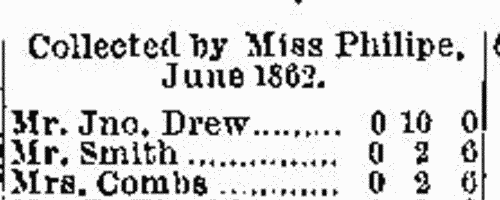
|
Missionaries and contributors
(1864)
The Evangelical Magazine and Missionary Chronicle records the work of Christian missionaries throughout the world, and of the supporting missionary societies collecting money for the work in the British Isles. Contributions are listed by congregation, and by family members making donations. | Sample scan, click to enlarge
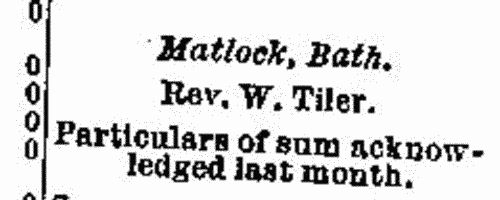
|
Congregationalist Ministers: Removals
(1868-1869)
In 'The Christian Witness and Congregational Magazine', published monthly, was a section called 'The Congregational Register', detailing recent Congregationalist activity at home and abroad. It included Ordinations; Recognitions (services when a new minister is introduced to his congregation); Calls Accepted (newly-qualified theological students are appointed to their first posts); Removals (of ministers from one place to another); Resignations; Deaths of Ministers; Deaths of Ministers' Wives; Deaths of Ministers' Widows; and Testimonials (presentations by congregations to long-serving or departing ministers). Precise dates and places are usually given in the case of ordinations, recognition services and deaths. The ministers are referred to by surname and initials; the ministers' wives and widows are never given christian name or initials. The register from New Series volume 5, issued from January to December 1869, covers events from October 1868 to November 1869. | Sample scan, click to enlarge
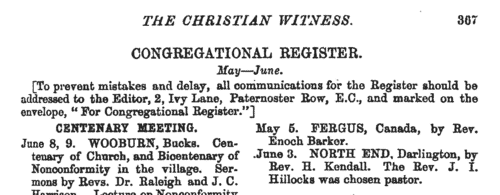
|
 Men of the 70th Regiment who fought in the New Zealand War
(1861-1870) Men of the 70th Regiment who fought in the New Zealand War
(1861-1870)
New Zealand War Medal roll for the 70th (The Surrey) Regiment of Foot: for service in the New Zealand campaign 1863 to 1866: the rolls were compiled following a general order in 1869 and the medals were distributed in 1870. The regiment embarked for Bengal 18 January 1849, and was moved to New Zealand in 1861; the men returned to England in 1866. | Sample scan, click to enlarge

|
London University Matriculation List
(1870)
The matriculation list of the University of London published in January 1870 shows all the students entering the university 1865 to 1869, but who had not yet taken an examination. The alphabetical list gives full name, surname first; year of matriculation; and the name of the school or college (or private study or the name of a tutor) of previous education. | Sample scan, click to enlarge

|
Innkeepers and Publicans in the City of London
(1874)
Henry Downes Miles compiled this London and Suburban Licensed Victuallers', Hotel and Tavern Keepers' Directory, which also had sections listings brewers, maltsters, hop factors, distillers and rectifiers of the United Kingdom. | Sample scan, click to enlarge
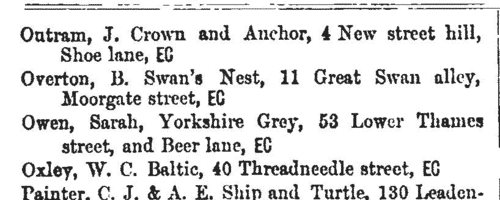
|
 Men of the 13th Regiment of Foot (1st Somersetshire - Prince Albert's Light Infantry) fighting in South Africa
(1877-1879) Men of the 13th Regiment of Foot (1st Somersetshire - Prince Albert's Light Infantry) fighting in South Africa
(1877-1879)
What is commonly called the Zulu War Medal was awarded to those British soldiers who fought in a series of conflicts in southern Africa from 1877 (the Kaffir War) through to 1879 (the Zulu War). In 1880 the various units submitted returns of the officers, non-commissioned officers and men 'entitled to the Medal for Military Operations in South Africa during 1877-8-9' and these 'medal rolls' are now in the National Archives. The returns are made with the information arranged in twelve columns:
1. Rank and name
2. Regimental number and rank at the time the medal was earned
3. Whether in possession of medal for previous wars
4. Whether engaged against the Gaikas, Galekas and other Kaffir tribes 1877-8
5. Whether engaged against Pokwane 1878
6. Whether engaged against the Griquas 1878
7. Whether engaged against the Zulus 1879
8. Whether engaged against Sekukuni as set forth in Par. 2. G. O.
9. Whether engaged against Moirosi's stronghold
10. Entitled to medal without clasp under Par. 4.
11. Serving with regiment, depot, dead, discharged, deserted, &c.
12. Notes and cross-references to the Adjutant-General's medal lists.
WO 100/46.
| Sample scan, click to enlarge
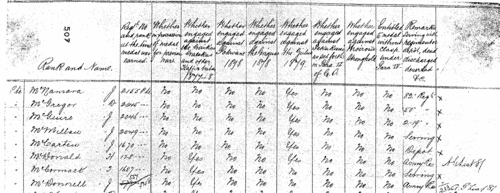
|
Bankrupts, Assignees, Trustees and Solicitors
(1880)
Bankruptcy notices in England and Wales, July to September 1880 | Sample scan, click to enlarge

|
Debtors, Insolvents and Bankrupts
(1880)
Bills of sale (binding assets to a creditor/lender), insolvencies and bankruptcies in England and Wales, April to June 1880 | Sample scan, click to enlarge

|
Research your ancestry, family history, genealogy and one-name study by direct access to original records and archives indexed by surname.












